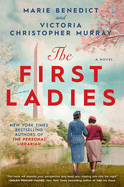
Two powerful American women form a friendship that enriches their lives and changes the course of history in The First Ladies, the second mesmerizing and revealing historical novel by Marie Benedict and Victoria Christopher Murray (The Personal Librarian). Eleanor Roosevelt and Mary McLeod Bethune meet at a Manhattan ladies' luncheon in 1927; Eleanor is the daughter-in-law of the hostess, society matron Sara Delano Roosevelt, and Mary is president of both the National Association of Colored Women Clubs and Bethune-Cookman College. The other guests do not conceal their racist shock. The 18-year arc of the novel ends in 1945, the fast friends clasping hands at the vote for the Charter of the United Nations, which addressed global equal rights.
Narrated in alternating chapters, Eleanor and Mary often provide two perspectives on the same scene, revealing the respect between the First Lady and "the First Lady of the Struggle." The tenacious women, often criticized, are committed to civil rights, including controversial anti-lynching legislation, as the United States edges toward World War II. They also focus on equality for Negroes in the military, relying on Eleanor's access to the president. A heartening story of friendship, The First Ladies also presents distinct perspectives on American history, including social and political roadblocks to racial equality and the behind-the-scenes support and loyalty between Eleanor and Franklin Roosevelt. "We're missionaries in our own land, normalizing the integration of the races," Mary observes of the inspiring, iconic team. --Cheryl McKeon, Book House of Stuyvesant Plaza, Albany, N.Y.

